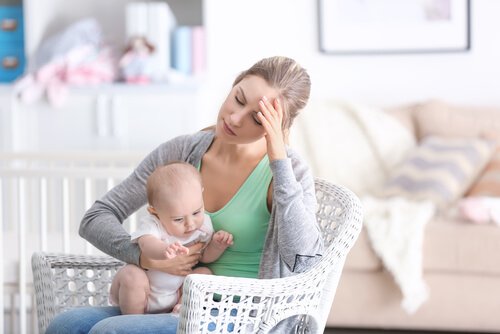Tips to Prevent Post-Adoption Depression

Although not everyone goes through it, post-adoption depression is a serious and real problem for people who adopt a child. In this article, we’ll tell you everything you need to know, so take note.
Certainly, there’s no guidebook that predicts what parents should expect when they adopt a child. In fact, even those who have already adopted before don’t know what their new addition will be like.
Every child is different, and parents need to adapt their lifestyle and parenting methods to meet every child’s needs.
In fact, post-adoption depression affects many men and women. For women who adopt after experiencing infertility, unresolved emotions can add to this depression. Without a doubt, not being able to have a biological child is a real and important loss.
Also, there are many different possible stressors. For examples, job loss, the parents’ age and the children’s behaviors also play an important role in post-adoption depression. The uncertainty of the baby accepting these parents as his or her own, as well as the fear of not being good parents, adds to these emotions.
All of this doesn’t mean that all parents are going to fall into depression. However, you should know how to recognize the symptoms in case they do appear.
Symptoms of post-adoption depression
There are many factors that contribute to post-adoption depression and that can make you feel sad or empty. If you’ve adopted a child and recognize any of these symptoms, we recommend seeking a specialist’s help as soon as possible.
- Increased or decreased appetite.
- Loss of interest or lack of motivation in daily activities.
- Fatigue and irritability for no reason
- Difficulty getting out of bed.

- Lack of motivation.
- Decreased sex drive.
- Feelings of helplessness and despair.
- Weight changes due to eating too little or too much.
- Lack of concentration and memory.
- Inability to make simple decisions.
- Headache from continuous tension.
Tips to avoid post-adoption depression
In reality, many adoptive parents feel like they’ve spent months or even years waiting for the moment to show that they’re exceptional parents, only to feel like they’ve failed once they actually adopted.
Very few people admit they feel this way and seek help. That said, the following advice can help you deal with and prevent post-adoption depression:
1. Assume the difficulties
Raising a child involves lots of sacrifices and responsibilities, and you must be prepared for them.
In fact, it can be difficult for some adoptive parents to admit to themselves, and especially others, that they’re having problems with something they’ve wanted for so long. However, even if you don’t want to do it for yourself, do it for the rest of your family.
2. Don’t set high parenting goals
Adoptive parents often overestimate their parenting skills. Also, when they feel like they aren’t connecting with their child, they feel disappointed.
Instead of setting high parenting goals, you have to learn to improve day by day. Don’t forget, no one can teach you how to raise your own children since it’s something you learn with experience.

3. Deal with possible obstacles along the way
If you’re thinking about adopting, be sure to talk to counselors about possible obstacles along the way. You can ask them about parenting in general, and also about yourself and the specific circumstances that led you to adoption.
In any case, you shouldn’t worry too much. It’s not always easy to deal with these situations. In addition, sometimes you just need help.
Finally, we recommend that if you feel like you have post-adoption depression, you should talk with friends and family that you trust. Also, form a support team that can give you a break from your motherly tasks, even if only for a few hours.
Additionally, don’t hesitate to seek professional help. You can treat depression with medications and therapy sessions. The sooner you seek treatment, the faster you can solve the problem!
Although not everyone goes through it, post-adoption depression is a serious and real problem for people who adopt a child. In this article, we’ll tell you everything you need to know, so take note.
Certainly, there’s no guidebook that predicts what parents should expect when they adopt a child. In fact, even those who have already adopted before don’t know what their new addition will be like.
Every child is different, and parents need to adapt their lifestyle and parenting methods to meet every child’s needs.
In fact, post-adoption depression affects many men and women. For women who adopt after experiencing infertility, unresolved emotions can add to this depression. Without a doubt, not being able to have a biological child is a real and important loss.
Also, there are many different possible stressors. For examples, job loss, the parents’ age and the children’s behaviors also play an important role in post-adoption depression. The uncertainty of the baby accepting these parents as his or her own, as well as the fear of not being good parents, adds to these emotions.
All of this doesn’t mean that all parents are going to fall into depression. However, you should know how to recognize the symptoms in case they do appear.
Symptoms of post-adoption depression
There are many factors that contribute to post-adoption depression and that can make you feel sad or empty. If you’ve adopted a child and recognize any of these symptoms, we recommend seeking a specialist’s help as soon as possible.
- Increased or decreased appetite.
- Loss of interest or lack of motivation in daily activities.
- Fatigue and irritability for no reason
- Difficulty getting out of bed.

- Lack of motivation.
- Decreased sex drive.
- Feelings of helplessness and despair.
- Weight changes due to eating too little or too much.
- Lack of concentration and memory.
- Inability to make simple decisions.
- Headache from continuous tension.
Tips to avoid post-adoption depression
In reality, many adoptive parents feel like they’ve spent months or even years waiting for the moment to show that they’re exceptional parents, only to feel like they’ve failed once they actually adopted.
Very few people admit they feel this way and seek help. That said, the following advice can help you deal with and prevent post-adoption depression:
1. Assume the difficulties
Raising a child involves lots of sacrifices and responsibilities, and you must be prepared for them.
In fact, it can be difficult for some adoptive parents to admit to themselves, and especially others, that they’re having problems with something they’ve wanted for so long. However, even if you don’t want to do it for yourself, do it for the rest of your family.
2. Don’t set high parenting goals
Adoptive parents often overestimate their parenting skills. Also, when they feel like they aren’t connecting with their child, they feel disappointed.
Instead of setting high parenting goals, you have to learn to improve day by day. Don’t forget, no one can teach you how to raise your own children since it’s something you learn with experience.

3. Deal with possible obstacles along the way
If you’re thinking about adopting, be sure to talk to counselors about possible obstacles along the way. You can ask them about parenting in general, and also about yourself and the specific circumstances that led you to adoption.
In any case, you shouldn’t worry too much. It’s not always easy to deal with these situations. In addition, sometimes you just need help.
Finally, we recommend that if you feel like you have post-adoption depression, you should talk with friends and family that you trust. Also, form a support team that can give you a break from your motherly tasks, even if only for a few hours.
Additionally, don’t hesitate to seek professional help. You can treat depression with medications and therapy sessions. The sooner you seek treatment, the faster you can solve the problem!
All cited sources were thoroughly reviewed by our team to ensure their quality, reliability, currency, and validity. The bibliography of this article was considered reliable and of academic or scientific accuracy.
- Senecky, Y., Agassi, H., Inbar, D., Horesh, N., Diamond, G., Bergman, Y. S., & Apter, A. (2009). Post-adoption depression among adoptive mothers. Journal of Affective Disorders, 115(1–2), 62–68. https://doi.org/10.1016/j.jad.2008.09.002
-
Payne, J. L., Fields, E. S., Meuchel, J. M., Jaffe, C. J., & Jha, M. (2010). Post adoption depression. Archives of Women’s Mental Health, 13(2), 147–151. https://doi.org/10.1007/s00737-009-0137-7
This text is provided for informational purposes only and does not replace consultation with a professional. If in doubt, consult your specialist.








